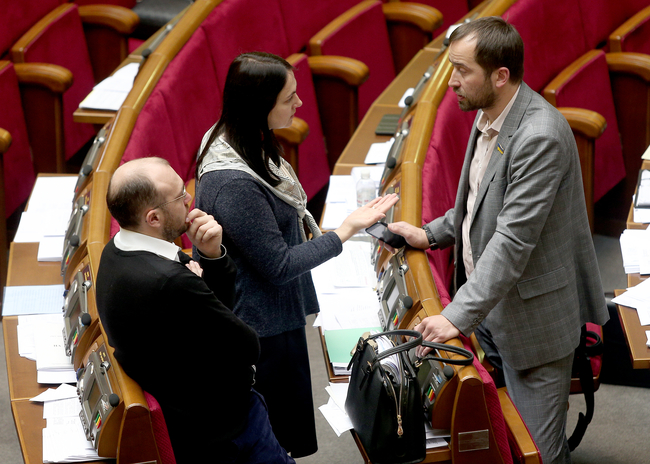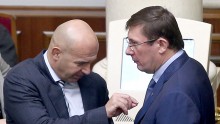Past week has once again seen haggling over a new coalition and Cabinet in parliament, again to no avail. Coalition is absent de facto and Yatseniuk’s Cabinet remains de jure effective and unchanged. Some would say that’s what politics are all about, with everyone struggling for a place in the sun. Ukraine, however, is a special case. Since the Euromaidan, and especially since the outbreak of Russia’s aggression, Ukraine has been in a situation that has required special efforts and responsibility from the politicians in power. For a number of years, most of them have been busy building their fortune and upgrading personal security instead of building an effective state. They are now busy doing precisely the same. Regrettably, noble ideas and principles are nowhere near the forefront and the ongoing war with its tragic consequences does not help the situation.
During his visit to the United States President Petro Poroshenko addressed the day-long forum, “Ukraine’s Ongoing Battle for Freedom: The Risk of Western failure in Political, Economic and Humanitarian Assistance,” in Washington. His video message was clear and vibrant in regard to Russia’s role in the war in Ukraine, but betrayed a degree of remoteness from reality insofar as domestic political effort and political crisis were concerned. Americans appear to be well aware of this. Poroshenko said: “The capital renovation of the anticorruption institutional system has been finalized. From now on, our priority goal is to make it functional and operational… (and further on, addressing Americans) don’t let pragmatism make you forget about values, with freedom being at the top of them. Don’t let America become small-minded.” This does not sound very convincing, considering the lack of progress in terms of reform in Ukraine.
President Poroshenko would bring to the United States a solution to the political crisis in Ukraine if he could. He couldn’t, so he didn’t, and this couldn’t but tell on Washington’s attitude toward the current Ukrainian administration.
In the meantime, Poroshenko’s fellow party members and associates have continued vying in the political interspecific competition. Several coalition options are being considered, all based on the Petro Poroshenko Bloc and People’s Front with a total of 216 seats in the Verkhovna Rada. Lobby talk is about Volodymyr Hroisman as the new prime minister, as though the man were already holding the post (and he had craved it after the parliamentary election, but PPB placing second had frustrated his plans). Therefore, Option One is collecting the required minimum of 226 votes through a PPB-PF-unaffiliated-MPs alliance. This assumption appears to be confirmed by the recent news about ex-Self-Reliance (Samopomich), currently unaffiliated MPs Iryna Suslova, Viktor Kryvenko, and Pavlo Kyshkar joining the Petro Poroshenko Bloc.

ALTHOUGH PAVLO KYSHKAR HAS JOINED THE PPB, NEITHER HE NOR HANNA HOPKO OR OSTAP YEDNAK HAVE LEFT THE “JOIN IN” PROJECT WHICH DECLARES ITSELF AS CONSERVATIVE / Photo by Ruslan KANIUKA, The Day
“I realize that joining the PPB isn’t a popular political decision and that it won’t raise my ratings. I also realize that this decision is actually the end of my political career,” Kyshkar told The Day, “but I’m ready to find a job on television or return to practicing law afterward. What made me make this decision wasn’t career or money, but a desire to prevent early elections, something some people want to happen. Let them look at me as though I were a defector, a traitor, but I have consciously acted contrary to my principles.” (As previously reported, Samopomich, Batkivshchyna, and Opposition Bloc are the factions campaigning for early parliamentary elections.)
Yaroslav Markevych (Samopomich): “We do not want early elections and we’re certainly making no efforts in that direction. This would be the wrong decision to make for this country. However, joining the Coalition and preserving the old political system would also be wrong.”
Oleksandr Chernenko (PPB): “I’m for a Coalition on a larger scale, with Batkivshchyna and Samopomich, but so far there are no other options. Batkivshchyna and the Radical Party have come up with specifically populist requirements that no one will meet, of course. Among them are lower tariffs, land sale moratorium, and so on. Many of these requirements run counter to the coalition agreement and the IMF memorandum. If these factions came up with requirements meant to be fulfilled, this would be one thing, but the impression is that their demands are meant as a formal reason for toppling the Coalition and having early elections.”
Be that as it may, the new Cabinet scenario has been composed on Bankova St. and made public by the media. Borys Lozhkin, head of the Presidential Administration – or his deputy Vitalii Kovalchuk – will be first deputy prime minister; Minister of Social Policy Pavlo Rozenko will be first deputy prime minister for humanitarian affairs. The social policy ministry will be headed by Andrii Reva,Volodymyr Hroisman’s associate when he was mayor of Vinnytsia. Volodymyr Slyshynsky, ex-deputy mayor of Vinnytsia, currently acting head of the Verkhovna Rada’s office, will also be a member of the new Cabinet.
Oligarch Viktor Pinchuk, ex-CEO of Yalta European Strategy, will be deputy prime minister for European integration. This position will be shared with Ivanna Klympush-Tsintsadze, deputy chairperson of the committee on foreign affairs. Hennadii Zubko will retain his post as deputy prime minister for regional development. Taras Kutovy, ex-chairman of the committee on agro-industrial complex, will be minister of agro-industrial complex. Ivan Miklos, ex-deputy prime ministry for economy of Slovakia, will be minister of finance. Volodymyr Demchyshyn, Ihor Nasalyk, and current deputy minister of economy Julia Kovaliv (formerly manager of Serhii Kurchenko’s UMH Group) are candidates for the post of minister of energy. Yurii Stets will remain minister of information (the man has several times tendered his resignation, saying his ministry has fulfilled its obligations). Yevhen Nyshchuk, this “voice of the Maidan,” is expected to become minister of culture.
People’s Front faction retains the Ministry of the Interior (Arsen Avakov) and Ministry of Justice (Pavlo Petrenko). Minister of Education Serhii Kvit is expected to be replaced by PF Lilia Hrynevych, currently chairperson of the science and education committee.
Andrii Parubii will be Speaker and Iryna Herashchenko, chairperson of the European integration committee, is to become First Deputy Speaker.
An unaffiliated MP told The Day, on condition of anonymity: “Liashko wants to be Speaker and doesn’t want to be a member of the Cabinet; he wants to remain in the media limelight and bear no political responsibility for what is happening in this country. PPB and PF have both refused this. PF continues its political life, having seats at the Cabinet, including the Interior Ministry. They have the time to work out new political projects. Yulia Tymoshenko would have been a member of the Coalition most interested in toppling it from within, but for her requirements that proved too high and she wasn’t admitted. After they collect the required 226 votes, they will turn to Batkivshchyna and Liashko’s Radical Party, proposing membership but with milder requirements.”
By press time, PPB leader Yurii Lutsenko had declared that the number of MPs in the PPB and PF factions could reach 226 on Thursday. Unaffiliated MP Ostap Yednak told The Day: “The only logical move for the PPB and PF would be to build the coalition relying on their own resources and thus overcome the crisis. I think now the problem isn’t patching up the coalition, forming it while Poroshenko is visiting the States, but finding a way out of the crisis, and this is a problem on a far larger scale.”
There was a real scandal in the Verkhovna Rada lobby between two young MPs when PPB’s Serhii Leshchenko called the newly admitted faction member, Iryna Suslova, a turncoat.
Hanna Hopko wrote on her Facebook: “Serhii Leshchenko, instead of calling fellow MPs turncoats for joining the PPB while building his image, capitalizing on Shokin’s resignation (for whom he had voted), should act decently, withdraw from the presidential faction and publicly admit his guilt of having voted for Shokin and helped Yulia Tymoshenko and other populists organize early elections to the [Verkhovna] Rada, expecting to head Saakashvili’s slate. Who is paying for Saakashvili’s concert tour? Judge not, that ye be not judged. [Signed] Unaffiliated.”
There are reasons behind that scandal and the conduct of some young MPs. During the Euromaidan and prior to the parliamentary elections, Den/The Day urged the public activists to unite and form a political force of their own (four roundtables were dedicated to the topic), lest their effort dissolve in old projects. Regrettably, the latter proved the case. Today one can often see younger politicians who are no different from the older ones. This does not mean that the new alternative is lost. It is still there, even if represented by several MPs or activists outside parliament. They should be supported.







